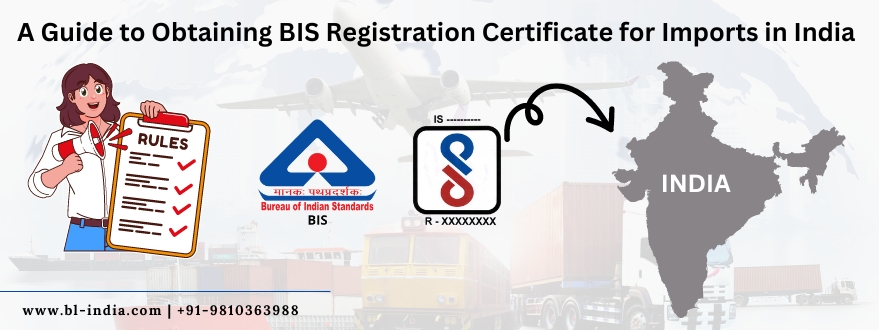Why acquiring a BIS Certification necessary for some products?

Acquiring BIS Certification is necessary for some products to comply with legal requirements, ensure consumer safety, access markets, enhance competitiveness and uphold quality standards. It is an essential step for manufacturers and importers seeking to demonstrate the quality, safety and reliability of their products in India.
In this blog, we will discuss the benefits of obtaining BIS certification, product categories requiring BIS certification, the process of obtaining BIS certification, etc.
What is BIS Certification?
BIS (Bureau of Indian Standards) is the national standards body of India.
BIS Certification is the process of obtaining certification for certain products manufactured or imported into India. It signifies that a product meets specific quality, safety and performance standards set by the Bureau of Indian Standards.
The BIS Certification process involves rigorous testing and evaluation of products against relevant Indian standards, as well as inspection of manufacturing facilities to ensure compliance with quality management systems. Products that typically require BIS Certification include electrical appliances, automotive components, consumer goods, building materials and industrial products.
Once a product successfully meets the requirements, BIS grants the BIS Certification and the manufacturer is authorized to use the BIS Mark on the certified product.
Benefits of obtaining BIS Certification
Obtaining BIS Certification offers several benefits for manufacturers, importers and consumers:
- Legal Compliance: BIS Certification ensures compliance with mandatory quality and safety standards set by the Bureau of Indian Standards. It helps manufacturers and importers avoid legal issues and penalties associated with non-compliance, ensuring smooth business operations within India.
- Market Access: BIS Certification is often a prerequisite for products to enter the Indian market. Having BIS Certification facilitates market access by meeting regulatory requirements, enabling manufacturers and importers to distribute and sell their products legally in India.
- Consumer Confidence: BIS Certification enhances consumer confidence in the quality, safety and reliability of products. The BIS mark on a product signifies adherence to recognized standards, assuring consumers of its performance, durability and safety, leading to increased trust and customer satisfaction.
- Competitive Advantage: BIS Certification provides a competitive edge in the market by demonstrating compliance with quality and safety standards. Certified products stand out among competitors, as they are perceived to be of higher quality and reliability, thereby
- Quality Assurance: BIS Certification ensures that products meet specified quality and safety standards, promoting consistency and reliability in their performance. It helps manufacturers maintain quality control throughout the production process, reducing defects and enhancing overall product quality.
Product categories that require BIS Certification
- Cement
- Household Electrical Goods
- Batteries
- Fire Extinguishers
- Automobile Accessories
- Steel and Iron Products
Check out the complete list of product categories that require BIS Certification.
Process of obtaining BIS Certification
The process of obtaining BIS (Bureau of Indian Standards) Certification typically involves several steps:
- Product Identification: Identify the specific product or products that require BIS Certification. Determine the applicable Indian Standards (IS) that the product must comply with for certification.
- Application Submission: Submit an application for BIS Certification to the Bureau of Indian Standards (BIS) or a BIS-approved certification agency. Include all necessary information about the product, such as technical specifications, intended use, manufacturing process and proposed testing methods.
- Documentation Preparation: Prepare the required documentation, including product drawings, technical specifications, manufacturing process details, quality control procedures and test reports. Ensure that all documentation complies with BIS requirements and standards.
- Testing and Evaluation: Send samples of the product to BIS-approved testing laboratories for evaluation. The product undergoes rigorous testing to assess its compliance with relevant Indian Standards (IS) for quality, safety and performance.
- Factory Inspection: BIS may conduct a factory inspection to verify the manufacturing process, quality control procedures and compliance with relevant standards. Ensure that the manufacturing facility meets BIS requirements and standards.
- Evaluation of Test Results: BIS evaluates the test results and factory inspection findings to determine whether the product meets the prescribed Indian Standards (IS) for certification.
- Granting of Certification: If the product meets all requirements, BIS grants the Certification. The product is authorized to bear the BIS Standard Mark, indicating compliance with quality, safety and performance standards.
Conclusion
BIS certification is mandatory for numerous sectors within India. This certification guarantees that products adhere to Indian safety and quality benchmarks, thus minimizing potential harm to consumers and streamlining the import-export procedures.
Brand Liaison acts as a reliable partner in the BIS certification process, providing expert guidance, documentation assistance, regulatory compliance, testing facilitation, coordination with authorities and timely support. We streamline the certification journey and helps clients achieve successful certification for their products.
You May Share it on Social Media-
